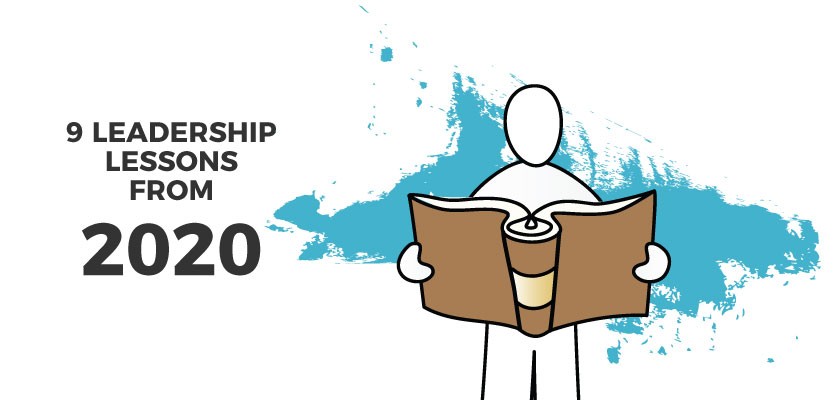9 Leadership Lessons 2020 Gave Us

9 Leadership Lessons 2020 Gave Us
2020, a year that tested our society like few others in recent memory -it’s safe to say that many people are looking forward to putting it behind them. However, 2020 has also shed light on so many systemic issues facing individuals and companies across the globe that we would be remiss if we didn’t reflect on the lessons that we can take into the future.
With that in mind, MIT Sloan Management Review contributors (who study leadership up close) were asked the following question: What lessons can managers take from 2020 and put into practice in the coming year?
Given their diverse research experience and backgrounds, our authors were able to offer numerous insights for how leaders at all levels in an organisation can commit to caring, foster supportive work cultures, and forge new paths in 2021.
Prepare for and Adapt to Increased Turbulence
Since 2008, I have followed four megatrends: climate change, urbanization, aging populations, and increased interconnectedness. In 2020, the convergence of these trends made clear that relative stability post-WWII is ceding to a period of increased turbulence. Leaders need to rethink their assumptions about constancy; build adaptive capacity, robustness, and resilience deep into their organisations; and reassess crisis readiness throughout their extended enterprises.
This year also made clear that leaders must look beyond their organisations, taking a true stakeholder view, to help address oft-overlooked economic, health care, housing, justice, and other inequities underlying the fragility of the current order. This will not be the last annus horribilis. The challenge for leaders is to step up now to be better prepared for the next one.
— Eric J. McNulty, associate director of the National Preparedness Leadership Initiative and author of “Leading Through COVID-19”
Reorient Your Road Map With Sense making
The challenges of 2020 highlight the importance of sense making — coming up with effective ways to make sense of the complex external world we are living in. When the pace of change is this fast, managers need to make sure that people update their understanding of shifts in technology, markets, customers, and competitive moves.
Only with an updated map of the world can there be effective action in it. For example, a team trying to create more innovative products in the pharma industry needs to be aware of shifts in scientific knowledge; the new ways that pharma companies are collaborating with each other, regulators, and patients; and new forms of sourcing raw materials. To neglect sense making is to be behind.
— Deborah Ancona, the Seley Distinguished Professor of Management and founder of the MIT Leadership Center at the MIT Sloan School of Management, and co-author of “The Overlooked Key to Leading Through Chaos”
Put Care at the Centre of Leadership
2020 has shown that it is urgent and necessary, not just desirable, to humanize leadership. The way we have been portraying, promoting, and practicing leadership for decades — as a cocktail of passion, vision, and skills — makes leaders ill prepared to recognise and alleviate human suffering, let alone address the systemic issues that cause and perpetuate it. It is time for those who care for good leadership to put care at the centre of leadership. May we stop conjuring foes that leaders need to fight and help leaders focus on healing and renewing our relationships and institutions instead.
— Gianpiero Petriglieri, associate professor of organisational behaviour at INSEAD and author of “Your People Need Care, Not a Battle Cry”
Unleash the Collective Genius of Your Team
“Treat your team meetings as sacred space.”
This advice comes from an exceptional leader fighting for all of us every day on the front lines. No one expects you to have all the answers — they know you are only human. You need to surround yourself with diversity of thought — you and your colleagues should act as sparring partners for each other, challenging each other to do your best thinking, to be your best selves. This pandemic demands that you go beyond what you should be doing to what you could be doing. It requires innovative problem-solving. It’s not about some individual having an aha moment. It’s about collective genius — unleashing the slices of genius on your team and harnessing them to fulfil the collective good.
You and your team need to take care of each other. Share not only what you are thinking but also how you are feeling. They know you are anxious, maybe even scared. Trust them with your emotions. Commit to taking care of each other — admit to each other that this year is not just a head challenge, it is a heart challenge as well. If this year has taught us anything, it is that leadership is about exercising moral imagination and courage.
This is no time to go it alone.
— Linda A. Hill, the Wallace Brett Donham Professor of Business Administration and faculty chair of the Leadership Initiative at Harvard Business School, and author of “Being the Agile Boss”
Foster a Culture That Enables Employees
We take from 2020 the lesson that much of what businesses encounter is neither fully controllable nor predictable, in part because every business operates interdependently with society, the economy, and the planet. But this highlights how critical it is that managers enable people to do their best work — individually and collectively — through tapping into their needs and strengths in flexible ways and actively managing a culture that supports adaptability and learning.
— Jennifer Howard-Grenville, the Diageo Professor in Organisation Studies at the Cambridge Judge Business School at the University of Cambridge and author of “How to Sustain Your Organisation’s Culture When Everyone Is Remote”
Build Shared Understanding Through Dialogue
2020 has shown us what social psychologists have known for years: that “people are demonstrably undone by too much uncertainty or social invalidation.”1
Managers in 2021 will have to fight against the ruinous effects of uncertainty and social invalidation by re-creating a shared social understanding — a shared reality that allows people to more accurately assess data and effectively coordinate.
2020 has also shown us that uncertainty and social invalidation are not constrained to our personal-life spheres; our personal and professional selves have never been more intertwined. Managers who engage in dialogue and develop practices to bridge the wide crevasse between how different people experience the same world can begin to rebuild (and heal) our sense of self and community.
— Morela Hernandez, the Donald and Lauren Morel Associate Professor in Business Administration at the Darden School of Business at the University of Virginia, and author of “What New Normal Should We Create?”
Emphasize Work-Life Balance for Your Teams
The future of work is upon us. The good news for managers is that people have never worked harder: Productivity is reaching unprecedented levels, caused by the en masse transition of work from offices to homes. The bad news is that mental well-being is suffering as a result: 94% of employees have experienced stress within the past 12 months. So it’s time for managers to take a cue from Microsoft and better structure the work-life boundaries of their teams, such as no meetings on Mondays and Fridays, and no emails after work, which France implemented back in 2017. Placing bookends to the workday like these can significantly improve employee satisfaction and, given that the average person will spend a third of their life working, is paramount to employee well-being during 2021 and beyond.
— Ben Laker, professor of leadership at Henley Business School at the University of Reading, and co-author of “How Leading Companies Are Innovating Remotely”
Give Special Attention and Care to Work Relationships
“Direction and balance: Running a business is like walking a tightrope.” These words, from an entrepreneur I interviewed recently, echo in my mind as I think about lessons from 2020 that managers may apply to 2021. As uncertainty continues to loom large, leaders may keep both direction and balance by focusing on deepening pre-existing, and nurturing new, high-quality work relationships while embracing experimentation. Why? High-quality work relationships help individuals feel safe and supported. In addition, they can enable workers to be more discerning in their choices, anchor their organisational commitment, and fuel their desire to reach high performance standards.
By embracing experimentation, managers may learn how to meet the fluid needs of both their colleagues and customers. After all, walking the tightrope requires attention and care — and this very attention and care will be especially critical for leaders in 2021.
— Eliana Crosina, assistant professor of entrepreneurship at Babson College and author of “Disrupted and Stronger: Looking In and Looking Out”
Build Restorative Habits Into Your Routine
Psychological research has shown how deeply the human mind craves predictability — but 2020 brought unrelenting uncertainty and all the stress that comes with it. It’s the leader’s job to help a team stay focused and positive, and that starts with holding it together personally. One practice I saw people gravitate to was adding a new routine to their day: engaging in a restorative activity. As a photographer, my favourite is #sixtysecondsolitude — a challenge to make short videos capturing mindful moments. But any such habit can deliver the psychological boost of creative achievement, along with a reassuring element of predictability.
— Hal Gregersen, senior lecturer in leadership and innovation at the MIT Sloan School of Management and author of “Digital Transformation Opens New Questions — and New Problems to Solve”
REFERENCES (1)
1. S.T. Fiske, “Five Core Social Motives, Plus or Minus Five,” in “Motivated Social Perception: The Ontario Symposium, Volume 9,” eds. S.J. Spencer, S. Fein, M.P. Zanna, et al. (Mahwah, New Jersey: Lawrence Erlbaum Associates, 2003), 223-246.
Author: Ally MacDonald
Source: https://sloanreview.mit.edu/article/nine-leadership-lessons-2020-gave-us/




